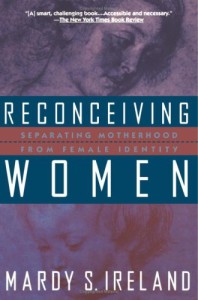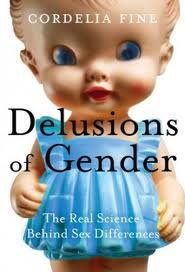Reading Rifflebooks giving thanks for November nonfiction releases inspired me to think about nonfiction books I am thankful for… There are so many! Here are just two that immediately came to mind:
Reconceiving Women: Separating Motherhood From Female Identity
by Mardy Ireland
Delusions of Gender: The Real Science Behind Sex Differences
by Cordelia Fine
Why these? Because each make significant contributions to our understanding of gender identity. Both are part of challenging what I call the pronatalist Normality Assumption. As I write in The Baby Matrix:
What is “normal” …relates to how we form our sense of identity, or how we develop our sense of our adult selves. For many years, we’ve tied identity to gender. Womanhood has been seen as synonymous with motherhood. For years, theories of female gender identity have said that if a woman shuns motherhood, it’s a sign of “abnormal” development of her female identity.
However, in the early 1990s, the feminist movement began to see it differently. In Reconceiving Women, Mardy Ireland notes that the era of “3rd Wave Feminism” viewed “motherhood as only one facet of female identity, and not central to the development of a woman’s sense of her adult self.” Years later, despite pronatalist doctrine to the contrary, this view of female identity has remained. As writer Naomi Rockler-Gladen puts it, “Third Wave feminists are encouraged to build their own identities from the available buffet, and to not worry if the items on their plate are not served together traditionally. Women can unapologetically celebrate a plate full of entrée choices like soccer mom, career woman, lover, wife, lesbian, activist, consumer, girly girl, tomboy, sweetheart, bitch, good girl, princess, or sex symbol.” In other words, motherhood is but one of the entrée choices women can include as part of building their unique identity.
Feminists aren’t the only ones who are challenging theories that say maternity is the cornerstone of a woman’s mature adult identity. Women of every ideology do so directly every time they make a conscious choice not to have children. Since the 1970s, more women have been choosing not to make motherhood part of their identity. Ireland claims that “these women are giving birth to additional forms of female identity.” More and more women are showing us that motherhood isn’t required for a strong sense of identity.
For men, “normal” male identity has not solely revolved around becoming a father, but it has been an important element of a man’s sense of self, along with occupation or line of work. Like with women who choose not to become mothers, men who choose not to become fathers have been viewed as abnormal. People who hold this view wonder how a man could not want to be a father when procreative virility sits right at the top of what it means to be a man. When men choose not to become fathers, they, too, challenge the notion that fatherhood has to be part of a man’s adult identity. They demonstrate that fatherhood is not required for a strong sense of identity as a man.
If motherhood and fatherhood aren’t required elements of adult identity, what does make up normal adult identities? For years, the elements that define our identities have started with gender and the ways in which boys and girls and men and women are innately different. Our identities have been defined by gender-based, hard-wired characteristics. For example, women traditionally have been seen as having more of a natural capacity for empathy and more interpersonal sensitivity than men. Men have been seen as more logical and analytical than women.
However, there are those who would challenge the idea that we should develop a self-concept stemming from what supposedly makes men and women different. In
Delusions of Gender, Cordelia Fine discusses how gender differences might not exist as much as we think. She questions contemporary science’s view as to how men and women are different. When we “follow the trail of contemporary science we discover a surprising number of gaps, assumptions, inconsistencies, poor methodologies, and leaps of faith” when it comes to explaining gender differences. She lays out many research studies that reveal how cultural and social context, more than innate biological differences, drive the development of gender differences. She posits how easily socialization and gender stereotyping can become self-fulfilling prophecies in how we see and understand ourselves. In other words, “it is the salience of gender and gender-related norms, rather than the gender per se, that lead to differences between men and women.”
And gender norms and stereotypes drive how we perceive our identity. Fine contends that seeing our self-concept and who we think we are “supposed” to be through the gender lens is not necessarily accurate, but we make it true as a result of deeply embedded social and cultural influences. The norms and stereotypes run so deep that we believe them to be unquestionably true. This not only limits our sense of identity but influences us to try and be who we’re not. Fine is on to the fact that basing identity on gender limits our identity to only those aspects of ourselves that relate to gender norms and stereotypical roles. When we base our identity on gender-based elements, other parts of ourselves get pushed aside, preventing a fuller sense of identity. We can also try to be the way we think we are supposed to be, even though, in reality, it isn’t who we really are. For example, women are traditionally supposed to be the “nurturers.” But the truth is not all women are natural nurturers. They think they’re supposed to be this way, so they end up trying to be something they are not in order to be a “normal” woman. Basing our identity on gender expectations can take us farther from, not closer to, knowing who we are.
What if we take gender and the stereotypes to which we’re supposed to adhere out of the identity equation? What would it then mean to have a “normal” sense of identity? Third Wave feminism would say to women, “It’s yours to create.” However, this is true for men, too. It would mean we could develop our sense of identity based on characteristics, traits, and roles that we feel are true expressions of ourselves and who we want to be in the world.
If we develop our sense of identity in this way, we expand identity to the concept of personal identity. It can include the idea of finding our “calling”—what we find ourselves being called to do in our lives, or what we feel drawn to create and contribute to the world. Finding our own personal identity through calling doesn’t have to begin when we’re adults. It can start early in life with our natural way of being, our personalities, characteristics, our gifts. It also starts with our curiosities—our intense interests, fascinations, even obsessions, from when we were young to those we have today. Allowing ourselves to truly follow our interests and the directions they take us can lead us to finding our own personal identity. We can then free ourselves from the confines of the life pronatalism tells us we’re supposed to have.
Mardy Ireland takes the idea of calling further. She feels we can form our sense of identity from the “inner call toward an individual life.” We can find a deep sense of personal identity from how we create and live an “authentic” life—one that is all our own. Our identity is not stuck in gender stereotypes and is not limited to our parental roles or solely our occupations. A “normal” sense of identity can be a unique combination of ways of being, personality, and roles that, together, form a more complete human identity.
I am so thankful for writers like Ireland and Fine, and their books that expand our thinking in very important ways.
What books to be thankful for come to mind for you and why?
Happy Thanksgiving!



